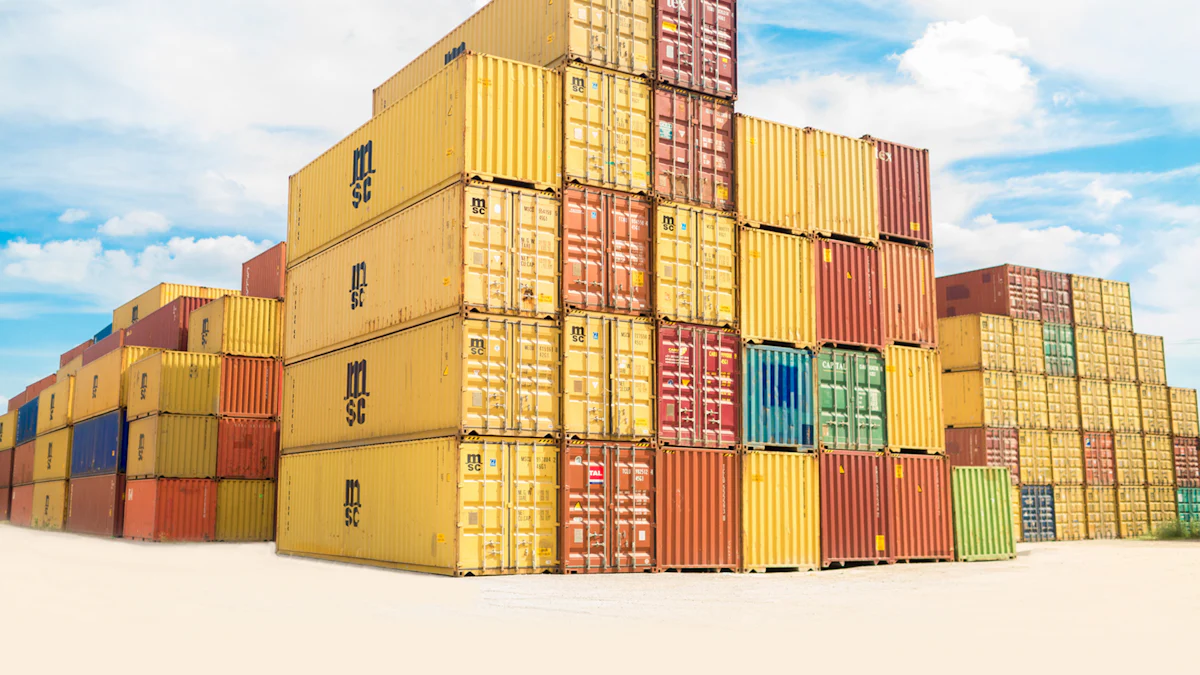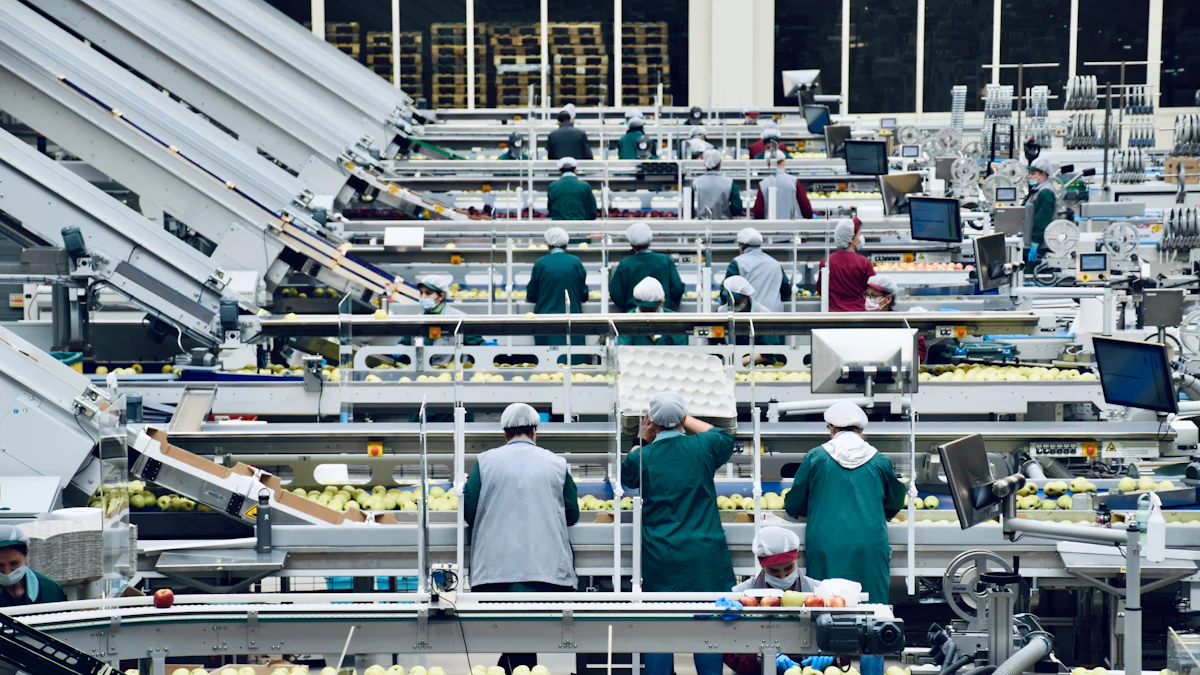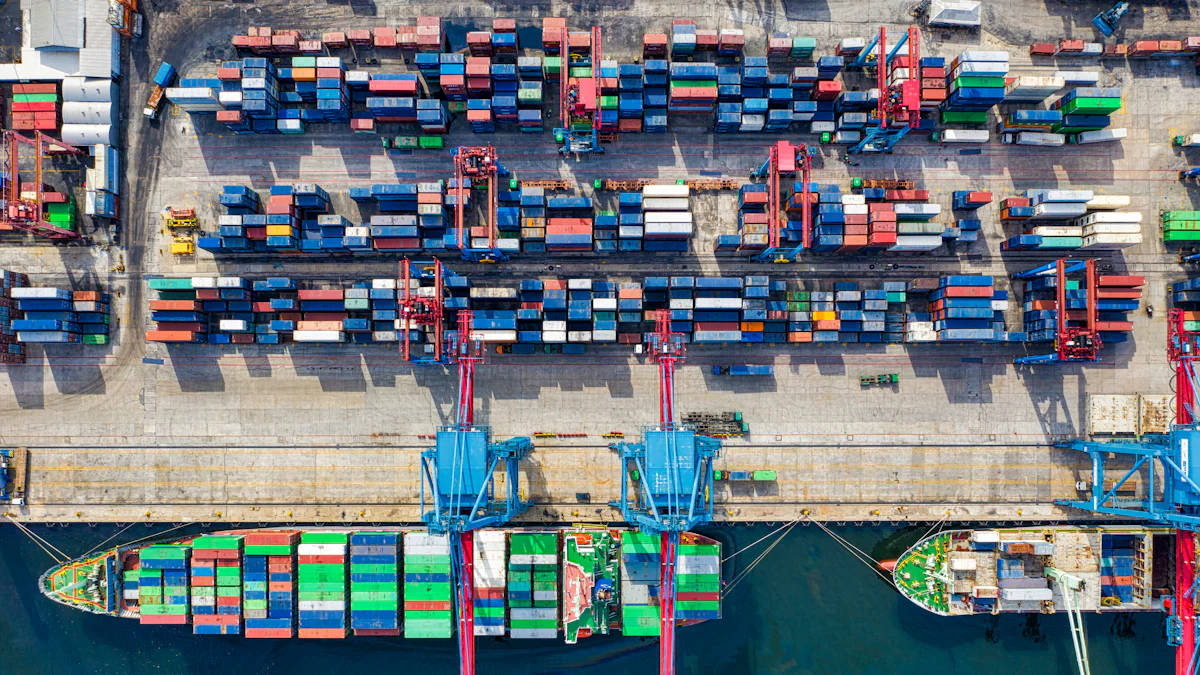Reinventing the Wheel: Mexico's Manufacturing Revolt and Its Chain Reaction

Mexico's manufacturing sector has experienced significant growth, contributing 16% to the country's GDP. The sector generated 5.51 billion Mexican pesos in Foreign Direct Investment (FDI) in the last quarter of 2022, with an 18% increase compared to the same period the previous year. Manufacturing represents a critical component of Mexico's economy, driving exports and creating jobs. The supply chain plays a vital role in this industry, ensuring efficient production and distribution. Recent developments highlight Mexico's strategic position as a manufacturing hub, particularly for the automotive and electrical machinery industries.
Recent Developments in Mexico's Manufacturing Sector

Technological Advancements
Automation and Robotics
Automation and robotics have revolutionized Mexico's manufacturing sector. Factories now use advanced machinery to streamline production processes. This shift enhances efficiency and reduces human error. Companies like General Motors and BMW have invested heavily in robotic technology. These investments improve product quality and speed up manufacturing timelines. Automation also helps in maintaining consistent production standards.
Industry 4.0 and Smart Manufacturing
Industry 4.0 represents the next phase of technological advancement in manufacturing. Mexico embraces this trend by integrating smart manufacturing techniques. The Internet of Things (IoT) plays a crucial role here. Sensors and interconnected devices provide real-time data. This data helps in making informed decisions quickly. Companies can monitor production lines remotely, ensuring optimal performance. Mexico's commitment to Industry 4.0 enhances its competitiveness on the global stage.
Foreign Direct Investment (FDI)
Key Investors and Partnerships
Foreign Direct Investment (FDI) continues to pour into Mexico's manufacturing sector. Major players from the United States and China show significant interest. Companies like Ford and Samsung have established manufacturing plants in Mexico. These investments highlight confidence in Mexico's market potential. Strategic partnerships between local and international firms foster innovation. These collaborations bring advanced technologies and expertise to the region.
Impact on Local Economy
FDI positively impacts the local economy in multiple ways. It creates job opportunities for the skilled workforce. The influx of capital boosts infrastructure development. Local suppliers benefit from increased demand for raw materials. FDI also enhances Mexico's export capabilities. The country excels in exporting automotive and electrical machinery. This economic dynamism strengthens Mexico's position as a manufacturing hub.
Government Policies and Initiatives
Trade Agreements
Mexico's government actively pursues trade agreements to bolster the manufacturing sector. The United States-Mexico-Canada Agreement (USMCA) stands out as a key example. This agreement facilitates smoother trade relations with neighboring countries. It reduces tariffs and simplifies customs procedures. Such policies make Mexico an attractive destination for manufacturers. The government also negotiates agreements with European and Asian countries. These efforts expand Mexico's reach in the global market.
Incentives for Manufacturers
The Mexican government offers various incentives to attract manufacturers. Tax breaks and subsidies reduce operational costs for companies. Special economic zones provide additional benefits. These zones offer streamlined regulatory processes and infrastructure support. Manufacturers enjoy easier access to resources and logistics networks. The government's proactive approach fosters a business-friendly environment. This strategy encourages more companies to set up operations in Mexico.
Trends in Supply Chain Evolution

Digital Transformation
Use of AI and Machine Learning
Artificial Intelligence (AI) and Machine Learning (ML) transform supply chain operations. Companies use AI to predict demand and optimize inventory levels. ML algorithms analyze data to identify patterns and trends. These technologies enhance decision-making processes. AI and ML improve efficiency and reduce operational costs. Manufacturers in Mexico adopt these tools to stay competitive. The adoption of digital transformation boosts performance and resilience.
Blockchain Technology
Blockchain technology brings transparency to supply chains. This technology records transactions in a secure and immutable ledger. Companies can track products from production to delivery. Blockchain reduces fraud and ensures authenticity. Manufacturers benefit from increased trust and accountability. The integration of blockchain supports efficient supply chain management. Mexico's manufacturing sector leverages blockchain for better traceability.
Sustainability and Green Supply Chains
Environmental Regulations
Environmental regulations drive sustainable practices in supply chains. Mexico enforces strict environmental laws to protect natural resources. Companies must comply with these regulations to operate. Compliance ensures reduced carbon emissions and waste. Manufacturers invest in eco-friendly technologies. These investments align with global sustainability goals. The commitment to green supply chains enhances Mexico's reputation.
Sustainable Practices and Innovations
Sustainable practices and innovations shape modern supply chains. Companies adopt renewable energy sources for production. Waste reduction and recycling become standard practices. Innovations in packaging materials reduce environmental impact. Manufacturers implement circular economy principles. These efforts contribute to a greener planet. Mexico's manufacturing sector leads in sustainable supply chain initiatives.
Resilience and Risk Management
Diversification of Suppliers
Diversification of suppliers strengthens supply chain resilience. Companies source materials from multiple suppliers to mitigate risks. This strategy reduces dependency on a single supplier. Diversified supply chains withstand disruptions better. Manufacturers in Mexico adopt this approach for stability. The diversification enhances flexibility and reliability.
Strategies for Mitigating Disruptions
Strategies for mitigating disruptions ensure continuous operations. Companies develop contingency plans for unforeseen events. Risk assessments identify potential vulnerabilities. Manufacturers invest in advanced technologies for real-time monitoring. These strategies minimize the impact of disruptions. Mexico's manufacturing sector prioritizes risk management. The focus on resilience supports sustained growth.
Case Studies and Examples
Success Stories in Mexican Manufacturing
Automotive Industry
The automotive industry in Mexico showcases remarkable success. Companies like General Motors and Ford have established large-scale manufacturing plants. These plants produce vehicles for both domestic and international markets. The strategic location of Mexico provides easy access to North American markets. This advantage reduces transportation costs and delivery times.
General Motors invested heavily in automation and robotics. This investment improved production efficiency and product quality. The use of advanced technology ensures consistent manufacturing standards. The automotive sector benefits from a skilled workforce. Local educational institutions offer specialized training programs. These programs prepare workers for high-tech manufacturing roles.
Ford formed strategic partnerships with local suppliers. These partnerships foster innovation and technological advancements. The collaboration between Ford and local firms enhances the supply chain. This synergy boosts the overall performance of the automotive industry in Mexico.
Electronics and Consumer Goods
The electronics and consumer goods sectors also demonstrate significant achievements. Companies like Samsung and Sony have established manufacturing operations in Mexico. These companies benefit from Mexico's favorable trade agreements. The United States-Mexico-Canada Agreement (USMCA) facilitates smoother trade relations. This agreement reduces tariffs and simplifies customs procedures.
Samsung leverages Mexico's skilled workforce and advanced infrastructure. The company produces a wide range of electronic products. These products include smartphones, televisions, and home appliances. The strategic location of Mexico allows for efficient distribution to North American markets. This advantage enhances Samsung's competitiveness on a global scale.
Sony focuses on sustainable manufacturing practices. The company invests in eco-friendly technologies and renewable energy sources. These investments align with global sustainability goals. The commitment to green supply chains enhances Sony's reputation. The electronics and consumer goods sectors in Mexico continue to thrive due to these strategic initiatives.
Lessons Learned from Supply Chain Innovations
Best Practices
Several best practices emerge from supply chain innovations in Mexico. Companies prioritize digital transformation to enhance efficiency. The use of Artificial Intelligence (AI) and Machine Learning (ML) optimizes inventory management. These technologies predict demand and identify trends. Manufacturers adopt blockchain technology for better traceability. Blockchain ensures transparency and reduces fraud in supply chains.
Diversification of suppliers strengthens supply chain resilience. Companies source materials from multiple suppliers to mitigate risks. This strategy reduces dependency on a single supplier. Diversified supply chains withstand disruptions better. Manufacturers in Mexico implement this approach for stability.
Challenges and Solutions
Supply chain innovations also present challenges. Companies face difficulties in integrating new technologies. The adoption of AI, ML, and blockchain requires significant investment. Training the workforce to use these technologies poses another challenge. Manufacturers address these issues through strategic planning and investment.
Risk management remains a critical focus. Companies develop contingency plans for unforeseen events. Risk assessments identify potential vulnerabilities. Manufacturers invest in advanced technologies for real-time monitoring. These strategies minimize the impact of disruptions. The focus on resilience supports sustained growth in Mexico's manufacturing sector.
Mexico's manufacturing sector has seen remarkable growth and technological advancements. Automation, robotics, and Industry 4.0 have transformed production processes, enhancing efficiency and product quality. Foreign Direct Investment (FDI) has boosted the local economy, creating jobs and fostering innovation.
Supply chain evolution trends include digital transformation, sustainability, and resilience. Companies in Mexico use AI, machine learning, and blockchain for better supply chain management. Environmental regulations and sustainable practices contribute to green supply chains.
The future outlook for Mexico's manufacturing and supply chain sectors appears promising. Continued investment in technology and strategic partnerships will likely drive further growth and competitiveness.
See Also
Transforming Industries with Cloud-Based Supply Chain Solutions
Efficient Solutions for High-Tech Manufacturing Supply Chain Challenges
5 Game-Changing Trends for Future Supply Chain Efficiency
